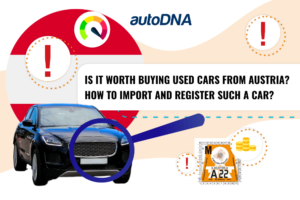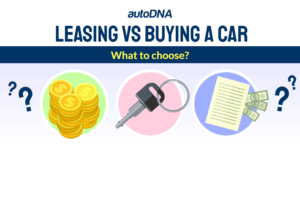
Car buying scams: How to avoid them?
Table of Contents
Table of Contents
Purchasing a car, whether new or used, can be an exciting experience. However, it’s also an area rife with risks and traps for the unsuspecting buyer. Car buying scams, ranging from fake online advertisements to odometer fraud, can lead to significant financial losses and headaches.
To ensure a smooth and safe buying process, it’s important to understand these scams and know how to avoid them. Let’s explore the most common scams, their warning signs, and practical steps to protect yourself.
Before finalizing any car deal, thoroughly review the purchase contract to understand your rights and any potential cancellation costs.
Understanding car buying scams
The car market, particularly the used car segment, is a fertile ground for scammers. They prey on buyers looking for a good deal, exploiting their eagerness or lack of experience. Scams can occur online, in person, or even at seemingly reputable dealerships.
Used cars can be a more affordable option, but they come with their own set of risks, including scams and legal issues.
One of the most common schemes is fake online listings, where scammers post vehicles at shockingly low prices. The sellers often invent stories to justify the low cost, like a sudden move abroad or a divorce forcing a quick sale. The victim is encouraged to make an upfront deposit or pay the entire amount, only to discover that the seller and the car are nowhere to be found. These scams are especially prevalent on platforms that don’t verify users or listings.
Another widespread scam is odometer fraud. By tampering with the mileage, scammers trick buyers into believing a vehicle has seen far less use than it really has. For example, a car with over 200,000 kilometers on the odometer might be rolled back to 80,000 to command a higher price. Signs of odometer fraud include a worn-out interior that doesn’t align with the low mileage, incomplete service records, or discrepancies in inspection reports.
A subtler but equally dangerous scam is title washing.
Vehicles that have been declared total losses due to severe accidents, floods, or other damages carry a salvage title.
Scammers alter these records by transferring the car’s ownership across states or falsifying documents, making the title appear clean. A car with a washed title can look perfect on the outside but may have hidden structural damage that makes it unsafe to drive.
Curbstoning is another deceitful practice, where unlicensed dealers pretend to be private sellers. They sell cars with undisclosed issues in parking lots or other neutral locations to avoid being traced. These vehicles often have mechanical or legal problems that the buyer discovers too late.
Prevalence and impact of car-buying scams
Car-buying scams are a significant concern for consumers, with the Federal Trade Commission (FTC) receiving over 35,000 reports of auto-related complaints in 2022 alone. These scams can result in financial losses, damage to credit scores, and even identity theft. The prevalence of car-buying scams is a major warning for prospective used car buyers, and it’s essential to be aware of the warning signs to protect yourself.
How to spot the warning signs
Scammers often rely on buyers’ eagerness and lack of caution. Knowing the red flags can help you avoid falling into their traps. Here are some key warning signs to look for:
- Prices that are too good to be true: If a car’s price is significantly lower than market value, it’s likely a scam. Always compare listings for similar models to identify unrealistic offers.
- Vague or rushed sellers: Scammers often avoid providing detailed information about the car or push for a quick sale. If the seller can’t answer basic questions, be cautious.
- Refusal to meet in person: Legitimate sellers will allow you to inspect and test drive the vehicle. If the seller insists on conducting everything remotely, it’s a major red flag.
- Requests for wire transfers: Wire transfers and cash payments are untraceable, making them the preferred method for scammers. Never send money before seeing the car.
- Suspicious VINs: If the Vehicle Identification Number (VIN) is missing, altered, or inconsistent with the documents, the car may be stolen or tampered with.
Common types of car buying scams
Understanding the most frequent car buying scams is the first step in protecting yourself. Here are the most common ones:
1. Fake online listings
Scammers often create fake car ads on popular websites, offering vehicles at prices that are too good to be true. The scammers typically claim they need to sell the car quickly because of personal circumstances, such as relocating or divorce.
Red flags:
- Extremely low prices compared to similar vehicles.
- Sellers unwilling to meet in person or show the car.
- Requests for upfront payments or deposits via wire transfer.
How to avoid it:
- Always compare the price with similar listings.
- Insist on seeing the car and meeting the seller before making any payments.
- Use trusted websites and platforms that verify listings.
2. Odometer fraud
This scam involves rolling back the odometer to reduce the recorded mileage, making the car appear less used. A car with lower mileage can sell for a higher price, even if it has significant wear and tear.
Red flags:
- Discrepancies between the car’s condition and the displayed mileage.
- Missing maintenance records or inconsistent mileage history.
How to avoid It:
- Check the vehicle’s history report for mileage records.
- Look for wear on pedals, steering wheels, and seats that don’t match the mileage.
- Have the car inspected by a mechanic.
3. Title washing
Title washing involves altering a car’s title to hide its history, such as previous damage, salvage status, or when a vehicle has been totaled. Scammers may move cars between states where reporting requirements vary.
Red flags:
- Clean titles on vehicles that seem too cheap or have visible damage.
- Sellers unwilling to provide full vehicle history.
How to avoid it:
- Use a VIN decoder or vehicle history report to check for hidden issues.
- Verify the car’s title with your local Department of Motor Vehicles (DMV).
4. Curbstoning
Curbstoners are unlicensed dealers who pose as private sellers to offload cars with hidden problems. They often advertise cars on online marketplaces or local classifieds.
Red flags:
- Seller unwilling to provide personal information.
- Frequent sales of multiple cars.
- Incomplete or fake documents.
How to avoid it:
- Ask for the seller’s ID and confirm ownership on the title.
- Be cautious if the seller wants to meet in a public place instead of their home.
5. Stolen vehicles
Some scammers attempt to sell stolen cars with fake documentation. These cars are typically priced below market value to lure buyers. VIN cloning is a common tactic used to disguise a stolen car or one with a salvaged title, posing risks such as potential repossession and complications from defective cars.
Red flags:
- VINs that are missing, tampered with, or inconsistent.
- Unusually low prices and sellers pushing for quick sales.
How to avoid it:
- Verify the VIN with a trusted vehicle history report.
- Check the vehicle’s documents carefully and confirm ownership.
Steps to avoid car buying scams
Here is a step-by-step guide to help you avoid scams when buying a car:
1. Research thoroughly
- Compare prices of similar vehicles to identify suspiciously cheap offers.
- Check the seller’s reviews and reputation on the platform.
2. Meet the seller in person
Never finalize a car purchase without meeting the seller and inspecting the vehicle. Choose a public, well-lit location for safety.
3. Verify documentation
- Ensure the title matches the seller’s name and has no alterations.
- Confirm the VIN on the car matches the VIN on the documents.
4. Avoid upfront payments
Avoid making any upfront payments, particularly via wire transfer, before you’ve inspected the vehicle. Scammers may pressure buyers into “securing the deal” with a deposit, often using car financing terms as bait to gain your trust. They might claim the payment is necessary to hold the car while you finalize financing arrangements. However, these payments are often untraceable and irreversible. Always ensure that all transactions are conducted securely, after a thorough inspection of the car and its documents.
5. Test Drive and inspect the car
- Always take the car for a test drive to check for any unusual noises or issues.
- Have the vehicle inspected by a trusted mechanic.
What to Do if You Suspect a Scam
If you encounter suspicious activity during a car purchase, take these steps:
- Stop communication: Do not provide further personal information or money.
- Report the scam: Notify the platform where the listing appeared and provide details.
- Contact authorities: Report the incident to local law enforcement or consumer protection agencies.
- Warn others: Share your experience to help others avoid similar scams.
Conclusion
Car buying scams are an unfortunate reality, but with awareness and caution, you can protect yourself. Always research the car, verify the VIN, and inspect the vehicle in person before making any payments. Be wary of deals that seem too good to be true, and trust your instincts if something doesn’t feel right.
By following these steps, you’ll ensure a safer, more transparent car buying process. Taking the time to verify every detail will not only protect your finances but also provide peace of mind, knowing that your new car is a reliable investment.
At autoDNA.com, the market-leading VIN decoding tool, you can free VIN lookup on a given vehicle. All you need for this is the VIN number. In the reports, on used cars, you can find information that will allow you to check whether the seller is telling the truth or not. In the report, you can find data on various topics. One of them is the vehicle history or stolen vehicle bases. You can do a VIN check for free 24/7 throughout the year.















